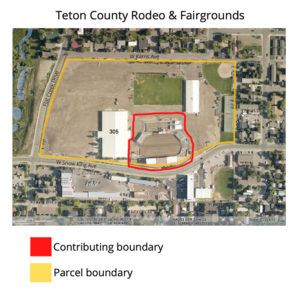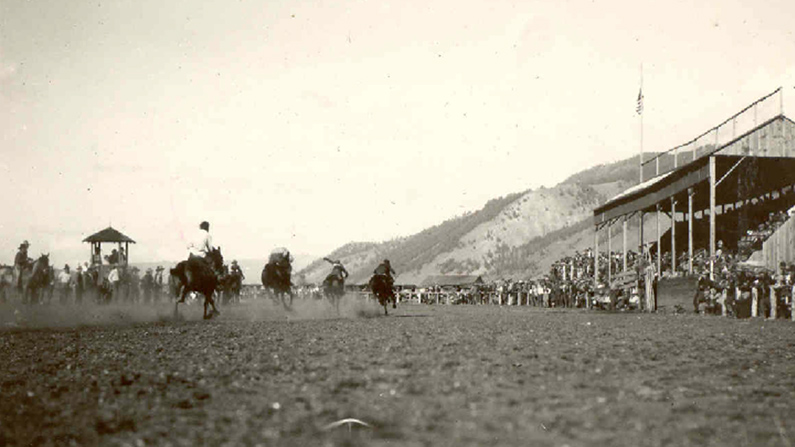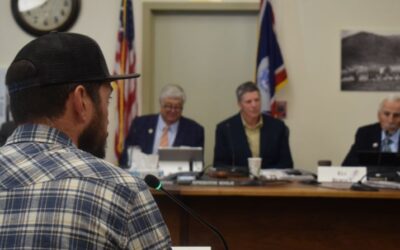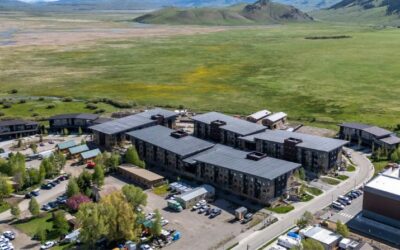A new historic survey of the Teton County Rodeo and Fairgrounds conducted by the Teton County Historic Preservation Board documents the cultural and physical history of the famous community gathering space in downtown Jackson. It’s a site now at the center of a controversy over a planned affordable housing project nearby—and as such, the timing of the new survey is no coincidence.
“This is something that we do on a regular basis. And we’ve done hundreds, literally, of these surveys,” said Michael Stern, president of the preservation board. “Many of them were done years ago, but as properties come to public attention we’ll do them again.”
Stern said the board has no agenda behind the survey besides providing information to the public. He also said the board isn’t taking a stance on whether or not a 48-unit housing project called the Flat Creek Apartments should move forward on one acre of town-owned land across the street from the rodeo arena.
Opponents of the development, namely the Save the Rodeo Grounds movement, argue that the acre is part of a historic 26-acre parcel that was originally purchased by the town for the fairgrounds and therefore it’s not appropriate to put housing there. However, the survey didn’t find any of the town land now south of Snow King Avenue to be “contributing” to the site’s historic nature.

The boundary around the area that the Teton County Historic Preservation Board has determined is “contributing” to the Teton County Rodeo and Fairgrounds’ historic character is outlined in red in the new survey. (Teton County Historic Preservation Board)
“That’s a technical term among historic preservationists. It means, ‘Does it contribute to the historic character of the structure or the place?’ And in this case, we’re really talking about what’s referred to as a cultural landscape,” Stern explained. “None of the buildings or structures themselves are considered to be contributing.”
What is considered “contributing” is the rodeo arena itself because of its longstanding use for the same purpose: The first rodeo was held on the site in 1945 and the overall, open-space design has been maintained since then. So, the preservation board determined that the rodeo is eligible for listing on the National Register of Historic Places—but it doesn’t have plans to pursue that just yet.
“We could take that step, but it’s another somewhat bureaucratic step,” Stern said. “And it’s important to know that even if a structure or a place are included on the National Register of Historic Places, it doesn’t offer any specific protections or inhibit the right of the property owner to make modifications.”
Supporters of the Flat Creek Apartments project, including the Jackson/Teton County Affordable Housing Department, which is developing it, and the housing advocacy organization Shelter JH argue that the 48 units are badly needed for low-income local residents; 860 applicants who are already on the housing department’s waiting list currently qualify, according to the department. Shelter JH Coordinator Clare Stumpf has also been outspoken about the possibility of a “win-win” scenario if the entire rodeo and fairgrounds could be relocated to a larger piece of land outside of town, paving the way for both a larger sports complex and more housing near downtown jobs and public transportation.
The Teton County Fair Board has supported such a move as far back as 2001, according to the Jackson Hole News&Guide. Opponents doubt that an appropriate—and affordable—new site will ever be identified.
Stern emphasized that the preservation board is staying out of the fray over the current housing debate but acknowledged the possibility that the board could get more involved if a proposed relocation of the rodeo arena comes to fruition.
“One of my main interests in the preservation board is to just maintain that sense of place in time and space and history, because it’s, I think, a really important part of our future as well as our past,” he said. “[We] should preserve those elements that defined it in the past because I think those are the most interesting places. The ones that get wiped out and turned into something they never were are often less interesting, whether it’s Rome or Jackson Hole.”





